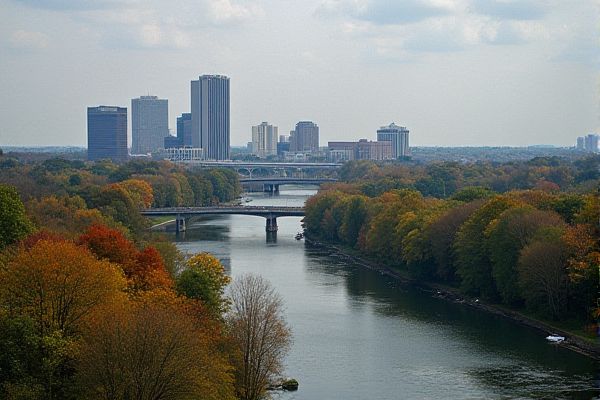
Moving to Arkansas checklist: Cost of living and housing prices. Job market and employment opportunities. Arkansas climate and weather patterns. Local schools and education system. Transportation options and infrastructure. Outdoor activities and recreation areas. Healthcare facilities and services. Cultural attractions and events. Arkansas taxes and utilities. Community and social organizations.
Cost of living and housing prices
In Arkansas, the cost of living is 14% lower than the national average, with housing costs being particularly affordable. The average home value is around $256,300 as of April 2024, and monthly rental prices for a two-bedroom apartment range from $600 to $1,167, depending on the region. For more detailed insights into the state's living expenses, you can explore the What Is The Cost Of Living In Arkansas page on the Unbiased website, which provides valuable resources and information.
Job market and employment opportunities
Arkansas has a robust job market with 102,000 job openings in September 2024, a job openings rate of 6.9%, and an average of 58,000 hires per month over the last 12 months. Key sectors seeing job expansions include Private Education and Health Services, Construction, and Government. For more detailed statistics and insights, visit the Bureau of Labor Statistics for comprehensive information about Arkansas’s employment trends.
Arkansas climate and weather patterns
Arkansas has a Humid Sub-Tropical Climate with four distinct seasons. The state experiences mild springs and falls, hot and humid summers with temperatures sometimes reaching the triple-digit range, and winters that can be cold with occasional snowfall, particularly in January. Precipitation is significant, especially in December and between March and May, with an average annual total of around 50 inches. For more in-depth information about the climate and living conditions, visit the Hendrix College International Admission webpage.
Local schools and education system
In Arkansas, the education system is guided by the Arkansas Curriculum Frameworks, which set rigorous academic standards for each grade level. Local school districts have the flexibility to develop specific curricula, and the system includes benchmark tests to measure student mastery and school performance. With a focus on transparency and parental involvement, these initiatives are supported by laws such as the Student Assessment and Educational Accountability Act (Act 35). For more detailed insights into these frameworks and their implementation, visit the official Arkansas Curriculum Frameworks documentation.
Transportation options and infrastructure
Arkansas has a comprehensive transportation infrastructure, featuring an impressive network that includes a total of 99,246 road miles divided into 82,019 rural and 17,227 urban miles. With 12,941 bridges spanning across the state, Arkansas supports robust freight movement with 2,845 miles of freight railroad and enhances travel options with 395 miles of passenger rail. The state is also home to 316 airports, among which are 9 primary and commercial airports, bolstering air traffic significantly. In addition, the extensive network of waterways features 203 docks, underscoring Arkansas' dedication to maintaining a dynamic and efficient transportation system.
Outdoor activities and recreation areas
Arkansas offers a wide range of outdoor activities, including hiking, rock climbing, stargazing, and water sports at places like Pinnacle Mountain State Park, the Arkansas River Trail, and numerous city parks, making it an ideal location for outdoor enthusiasts. The state is also home to over 52 state parks, national forests, and rivers, providing ample opportunities for biking, camping, fishing, and other recreational activities. For more detailed information on these outdoor adventures, explore the Arkansas Outdoors website.
Healthcare facilities and services
When moving to Arkansas, it is crucial to familiarize yourself with the state's healthcare facilities and services. The Arkansas Department of Health regulates and licenses various health facilities, including hospitals, outpatient clinics, home health agencies, and more, ensuring compliance with health standards and providing a comprehensive list of available healthcare services. For veterans, the VA Central Arkansas Health Care system offers a wide range of health services, including primary care, emergency care, geriatrics, pharmacy services, women's health, audiology and speech pathology, and specialized care like cardiology and dental services, all of which can be accessed through various facilities and clinics across the state.
Cultural attractions and events
Arkansas offers a rich cultural experience with attractions like the Historic Arkansas Museum, Mosaic Templars Cultural Center, and various festivals such as the Arkansas Literary Festival, Arkansas Scottish Festival, and Riverfest Arkansas, providing a diverse range of historical, artistic, and cultural events to engage with. For more detailed information about these exciting opportunities, you can visit the Interexchange website, which showcases the vibrant cultural heritage of the state.
Arkansas taxes and utilities
To establish residency in Arkansas, you must understand the state's tax laws, including filing requirements for income tax and be aware of local sales and use taxes, as well as other miscellaneous taxes. When planning your move, it's essential to manage utilities efficiently by contacting service providers at least two weeks in advance. This includes setting up or transferring services for electricity, natural gas, internet, TV, and home security. Additionally, arranging water and sewer services through your local municipality or utility companies, such as Central Arkansas Water, is crucial for a smooth transition. For a comprehensive overview and guidance on moving to the state, consider exploring the Arkansas Moving Guide to ensure all aspects of your relocation are covered effectively.
Community and social organizations
When moving to Arkansas, getting involved in the community through various nonprofit organizations can be beneficial. The Little Rock Chamber's list includes numerous organizations such as the Humane Society of Pulaski County, Arkansas Community Action Agencies Association, and the Arkansas Community Foundation, among others, where you can volunteer, join, or seek services to integrate into the community and support local causes.
